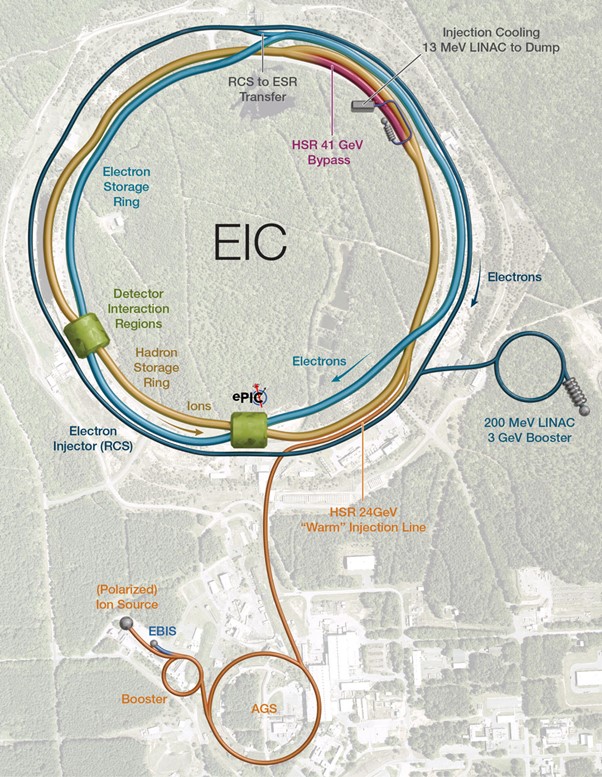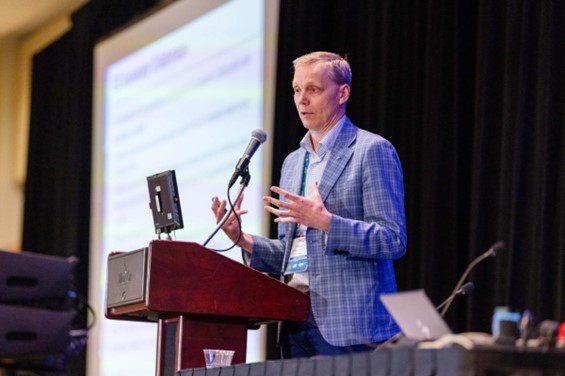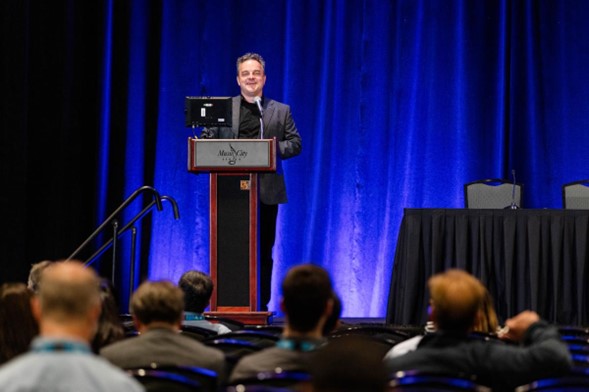Particle accelerators like the Large Hadron Collider (LHC) at CERN have previously revolutionised our understanding of physics, leading to breakthrough discoveries such as the Higgs boson, a vital building block of our universe. But little is known about how quarks and gluons form the core of nearly all visible matter.
The Electron-Ion Collider (EIC) is a next generation accelerator that is being developed to explore the fundamental structure of matter and to understand the glue-like force field that binds the universe together. It will be constructed at Brookhaven National Lab (BNL) in the US on the basis of the Relativistic Heavy Ion Collider (RHIC) and consist of two intersecting accelerators: one producing an intense beam of electrons, the other one a high-energy beam of protons or heavier atomic nuclei, which are steered into collisions.

From its very beginning, the EIC was envisioned as an international project, drawing a large number of collaborators from around the globe for both the experimental detector and accelerator facility. The EIC accelerator workshops held in 2020 and 2021 attracted hundreds of participants from over 20 countries. Numerous technical meetings with representatives from national and international institutions provided more evidence of the widespread interest in this collaboration.
The design, construction, and future upgrades of this innovative machine will offer exciting scientific and technical challenges, creating opportunities for closely connected worldwide accelerator R&D. In addition to groundbreaking physics discoveries, the EIC could spark technological innovations with far-reaching effects on health and other grand research challenges.
The EIC Accelerator Collaboration, conceived in December 2023, aims to realise the full potential of these exciting opportunities, calling on national and international expertise to contribute to the design and construction of the EIC accelerator components. Created to support the EIC project, its partners, and the broader community of accelerator experts, the collaboration is expected to drive the long-term development and optimise the ultimate performance of the EIC.
To address these numerous technical challenges, the collaboration has started to establish working groups that will specialise in areas such as beam dynamics, beam optics, and beam-beam effects, to name a few.

Nearly 200 accelerator experts from around the world joined the EIC Accelerator Collaboration kick-off event during the15th International Particle Accelerator Conference (IPAC’24) in Nashville, US, in May this year to discuss the next steps to make the EIC a reality.
There, Sergei Nagaitsev, EIC technical director, provided an update on the status of the EIC. This was followed by an introduction of the EIC Accelerator Collaboration by its co-chairs Carsten P Welsch (University of Liverpool/Cockcroft Institute) and Andrei Seryi (Jefferson Lab and Old Dominion University).
The collaboration's mission is to serve as a platform for discussion and coordination among EIC accelerator-related working groups, foster opportunities for institutions to contribute to the EIC construction project, identify and promote accelerator research and development (R&D) initiatives, represent the accelerator R&D community to EIC stakeholders, and engage with various long-term planning panels.

Co-chair Carsten Welsch said: “By bringing together the best experts in our field, we will maximize the science and discovery potential of this unique accelerator. The launch of a formal charter and clear process for institutions to express their specific R&D interests in the EIC will help us coordinate discussions and foster international collaboration.”
Following the kick-off meeting, an Institutional Collaboration Board has been established, alongside an EIC Industry Forum. The accelerator collaboration continues to invite expressions of interest from experts around the world who would like to contribute to this global project.
The EIC will be built at Brookhaven Lab and is being developed in partnership with DOE’s Thomas Jefferson National Accelerator Facility (Jefferson Lab). Construction is expected to start in 2026 with operations beginning in the first half of the next decade.
Register your interest in the EIC Accelerator Collaboration here: https://forms.office.com/pages/responsepage.aspx?id=MVElUymxEECG4UdL_X6AdqIu1RZY6ylPolT-w4dVDZ9UMEtSTUpPSlpPUFpWN1JFOTBUVjZCSzE2VC4u
